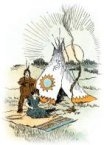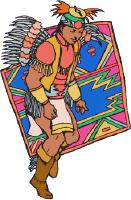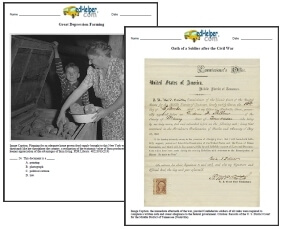
Worksheets and No Prep Teaching Resources
Reading Comprehension Worksheets
Native Americans

Native Americans
 Worksheets and No Prep Teaching Resources Reading Comprehension Worksheets Native Americans |
 Native Americans |
| edHelper's suggested reading level: | grades 4 to 6 | |
| Flesch-Kincaid grade level: | 9.02 |
|
Who Were the First Americans?
By Jennifer Kenny |

|
 1 Native Americans were the people who lived on the North American continent thousands of years before the European settlers started their voyages of discovery in the fifteenth century. Most scientists agree that Native Americans traveled to this land from Asia during a series of several migrations. They walked across a land bridge that connected the two continents across what is now the Bering Strait. They then moved east and south from the Alaskan area. These migrations are believed to have begun more than 10,000 years ago. Some scholars will argue that it could have been as far back as 25,000 years ago!
1 Native Americans were the people who lived on the North American continent thousands of years before the European settlers started their voyages of discovery in the fifteenth century. Most scientists agree that Native Americans traveled to this land from Asia during a series of several migrations. They walked across a land bridge that connected the two continents across what is now the Bering Strait. They then moved east and south from the Alaskan area. These migrations are believed to have begun more than 10,000 years ago. Some scholars will argue that it could have been as far back as 25,000 years ago! |
Create Weekly Reading Books
Prepare for an entire week at once! |
| Leave your feedback on Who Were the First Americans? (use this link if you found an error in the story) |
 |
Native Americans
|
 |
United States
|
|
|
 | Fifty States Theme Unit |
 |
Document Based Activities |